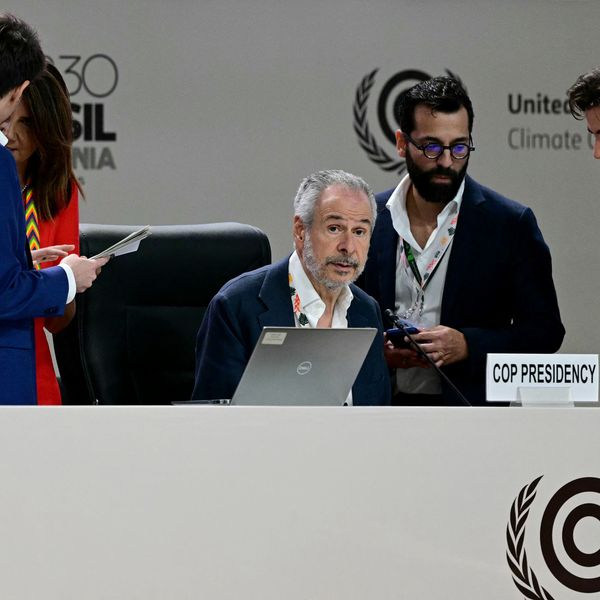Fossil Fuel Giants Guzzling World's Water as Poor Go Thirsty: UN
'Great political clout' of energy industry trumps those in need of drinking water

"There is an increasing potential for serious conflict between power generation, other water users and environmental considerations," says the World Water Development Report 2014: Water and Energy (pdf), published on the eve of World Water Day.
The energy sector, which has "great political clout," the report states, is set to consume an unfair share of this limited resource, "despite ongoing progress in the development of renewables." The report continues:
The overall evolution of the global energy mix appears to remain on a relatively fixed path: that of continued reliance on fossil fuels. Oil and gas extraction yields high volumes of 'produced water', which comes out of the well along with the oil and gas. Produced water is usually very difficult and expensive to treat. Unconventional oil and gas production is generally more water intensive than conventional oil and gas production.
While water demand is set to increase 55% by 2050, water use for energy production is set to increase 20% by 2035.
Whereas an estimated 768 million people lack access to clean drinking water and 2.5 billion lack access to basic sanitation, rich and developing countries are soaking up mass quantities of water in the energy industry, wherein 90% of power generation is water-intensive.
"There will be no sustainable development without better access to water and energy for all," said director general of Unesco, Irina Bokova.
"Demand for fresh water and energy will continue to increase over the coming decades to meet the needs of growing populations and economies," the report says, "changing lifestyles and evolving consumption patterns, greatly amplifying existing pressures on limited natural resources and on ecosystems."
As a result, it continues, freshwater availability will be "increasingly strained over this period of time, and more than 40% of the global population is projected to be living in areas of severe water stress through 2050. There is clear evidence that groundwater supplies are diminishing, with an estimated 20% of the world's aquifers being over-exploited, some critically so."
______________________
An Urgent Message From Our Co-Founder
Dear Common Dreams reader, The U.S. is on a fast track to authoritarianism like nothing I've ever seen. Meanwhile, corporate news outlets are utterly capitulating to Trump, twisting their coverage to avoid drawing his ire while lining up to stuff cash in his pockets. That's why I believe that Common Dreams is doing the best and most consequential reporting that we've ever done. Our small but mighty team is a progressive reporting powerhouse, covering the news every day that the corporate media never will. Our mission has always been simple: To inform. To inspire. And to ignite change for the common good. Now here's the key piece that I want all our readers to understand: None of this would be possible without your financial support. That's not just some fundraising cliche. It's the absolute and literal truth. We don't accept corporate advertising and never will. We don't have a paywall because we don't think people should be blocked from critical news based on their ability to pay. Everything we do is funded by the donations of readers like you. Will you donate now to help power the nonprofit, independent reporting of Common Dreams? Thank you for being a vital member of our community. Together, we can keep independent journalism alive when it’s needed most. - Craig Brown, Co-founder |
Jacob Chamberlain is a former staff writer for Common Dreams. He is the author of Migrant Justice in the Age of Removal. His website is www.jacobpchamberlain.com.

"There is an increasing potential for serious conflict between power generation, other water users and environmental considerations," says the World Water Development Report 2014: Water and Energy (pdf), published on the eve of World Water Day.
The energy sector, which has "great political clout," the report states, is set to consume an unfair share of this limited resource, "despite ongoing progress in the development of renewables." The report continues:
The overall evolution of the global energy mix appears to remain on a relatively fixed path: that of continued reliance on fossil fuels. Oil and gas extraction yields high volumes of 'produced water', which comes out of the well along with the oil and gas. Produced water is usually very difficult and expensive to treat. Unconventional oil and gas production is generally more water intensive than conventional oil and gas production.
While water demand is set to increase 55% by 2050, water use for energy production is set to increase 20% by 2035.
Whereas an estimated 768 million people lack access to clean drinking water and 2.5 billion lack access to basic sanitation, rich and developing countries are soaking up mass quantities of water in the energy industry, wherein 90% of power generation is water-intensive.
"There will be no sustainable development without better access to water and energy for all," said director general of Unesco, Irina Bokova.
"Demand for fresh water and energy will continue to increase over the coming decades to meet the needs of growing populations and economies," the report says, "changing lifestyles and evolving consumption patterns, greatly amplifying existing pressures on limited natural resources and on ecosystems."
As a result, it continues, freshwater availability will be "increasingly strained over this period of time, and more than 40% of the global population is projected to be living in areas of severe water stress through 2050. There is clear evidence that groundwater supplies are diminishing, with an estimated 20% of the world's aquifers being over-exploited, some critically so."
______________________
Jacob Chamberlain is a former staff writer for Common Dreams. He is the author of Migrant Justice in the Age of Removal. His website is www.jacobpchamberlain.com.

"There is an increasing potential for serious conflict between power generation, other water users and environmental considerations," says the World Water Development Report 2014: Water and Energy (pdf), published on the eve of World Water Day.
The energy sector, which has "great political clout," the report states, is set to consume an unfair share of this limited resource, "despite ongoing progress in the development of renewables." The report continues:
The overall evolution of the global energy mix appears to remain on a relatively fixed path: that of continued reliance on fossil fuels. Oil and gas extraction yields high volumes of 'produced water', which comes out of the well along with the oil and gas. Produced water is usually very difficult and expensive to treat. Unconventional oil and gas production is generally more water intensive than conventional oil and gas production.
While water demand is set to increase 55% by 2050, water use for energy production is set to increase 20% by 2035.
Whereas an estimated 768 million people lack access to clean drinking water and 2.5 billion lack access to basic sanitation, rich and developing countries are soaking up mass quantities of water in the energy industry, wherein 90% of power generation is water-intensive.
"There will be no sustainable development without better access to water and energy for all," said director general of Unesco, Irina Bokova.
"Demand for fresh water and energy will continue to increase over the coming decades to meet the needs of growing populations and economies," the report says, "changing lifestyles and evolving consumption patterns, greatly amplifying existing pressures on limited natural resources and on ecosystems."
As a result, it continues, freshwater availability will be "increasingly strained over this period of time, and more than 40% of the global population is projected to be living in areas of severe water stress through 2050. There is clear evidence that groundwater supplies are diminishing, with an estimated 20% of the world's aquifers being over-exploited, some critically so."
______________________

